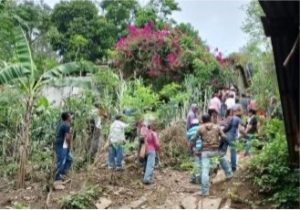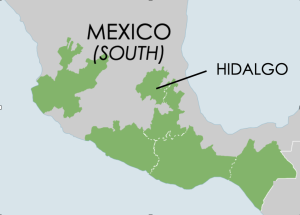 Local government officials in Hidalgo state in southern Mexico are pressurising a group of 151 Baptists expelled from their villages to sign an agreement that violates human rights protections under Mexican law.
Local government officials in Hidalgo state in southern Mexico are pressurising a group of 151 Baptists expelled from their villages to sign an agreement that violates human rights protections under Mexican law.
The Baptists, all of whom belong to the Great Commission Baptist Church, were forced out of the neighbouring villages of Coamila and Rancho Nuevo on 26 April because of their religious beliefs. Village leaders cut off their electricity, vandalised and blocked access to their church and some of their homes and posted guards at the entry points to the villages. The expelled Christians had suffered years of persecution because of their refusal to participate in local religious festivals that are incompatible with their faith.
In a press conference on 15 May, Pastor Rogelio Hernández Baltazar and church leader Nicolás Hernández Solórzano said that they do not want to accept the agreement, which is being pushed by the municipal government in the city of Huetutla de los Reyes, because it would allow village leaders to fine the victims 150,000 Mexican Pesos (approximately €8280), ban five families from returning and only permit the other families to return under the severe restrictions that have been imposed on them since 2015.
The group of expelled Christians numbered 139 at first, but grew as church members working outside their villages at the time were refused entry when they tried to go home.
Members of the expelled group, which includes 75 children and babies, sought sanctuary in the Municipal Presidency building in Huejutla de los Reyes, where they called on municipal and state authorities to intervene to allow them to return home and practice their faith freely. The government initially provided food and water, but in insufficient quantities, and the group was then moved to another location where local churches provided humanitarian aid and joined in the call for the government to respond.
Persecution intensifies
Baptists in Rancho Nuevo and Coamila have suffered harassment and attacks since 2015 but the municipal government denies that the incidents are linked to religious freedom. Church members have been detained, beaten, barred from accessing medical care, sacked from their jobs, prevented from burying their dead, had their lands confiscated and since 2018 their children have been banned from attending the local school. In 2016 the Baptists were warned against accessing or using their land for cultivating crops, their main source of food and income.
In one of the most serious attacks, a church member was admitted to hospital in a critical condition in December 2022 after village leaders tied her to a tree and beat her. She survived, but was left with persistent back pain.
The recent expulsion follows a month of intensified pressure, beginning on 25 March when Pastor Rogelio and two other church leaders were detained by Coamila authorities and only released when an agreement was signed after 48 hours of negotiations.
In early April, village leaders sanctioned the takeover of five plots of land belonging to church members by Coamila residents who destroyed their crops and cut down trees. Three houses were fenced off, preventing the owners from accessing their homes. Church members were attacked several times, including with machetes, and almost every night villagers tried to break down the door of the pastor’s house.
This persecution, like that in many other parts of southern Mexico, is rooted in the village leaders’ insistence that the Baptists convert back to the local majority religion. The Baptists have repeatedly been forced to attend community meetings where local leaders demand that they take part in religious festivals by donating and participating in acts of worship.
Background
 In parts of Mexico, especially in mountainous regions of the southern states, the majority religion is a folk Catholicism that blends pre-Hispanic Mayan practices with Catholicism in a syncretic Christo-pagan religion. Community life centres on religious holidays that involve heavy drinking and pagan elements, and evangelical Christianity is viewed as an American religion.
In parts of Mexico, especially in mountainous regions of the southern states, the majority religion is a folk Catholicism that blends pre-Hispanic Mayan practices with Catholicism in a syncretic Christo-pagan religion. Community life centres on religious holidays that involve heavy drinking and pagan elements, and evangelical Christianity is viewed as an American religion.
In these regions pressure to participate in religious festivals has been an ongoing issue for many years. Evangelicals who choose not to participate or cannot afford to are fined or jailed, and if they still refuse they are denied services such as water and electricity and risk their church buildings and homes being burned and their belongings confiscated. Ultimately, the evangelicals are forced to leave the community.
Indigenous communities like Rancho Nuevo and Coamila are governed under Mexico’s Law of Uses and Customs, which protects their right to maintain traditional methods of local governance, but the Law is supposed to be applied in line with the constitution (which guarantees freedom of religion or belief) and the international conventions to which Mexico is party. In many communities, however, these protections are not upheld and state governments seldom intervene on behalf of religious minorities. Religious freedom violations are common in communities governed under the Law of Uses and Customs.
As well as the issue of refusing to participate in festivals, Mexican Christians of all denominations face persecution from drug cartels, which consider churches a threat because their leaders speak out against violence and criminal operations. Some pastors and priests have been kidnapped or killed and thousands face death threats and intimidation.
Read more about Mexican Christians in Church in Chains’ Mexico Country Profile.
(Christian Solidarity Worldwide, Church in Chains Mexico Country Profile, Evangelical Focus, International Christian Concern, Voice of the Martyrs Canada)
Photo: Christians displaced from Coamila and Rancho Nuevo (Christian Solidarity Worldwide)
Map: Adapted from Church in Chains Global Guide (4th Edition)
